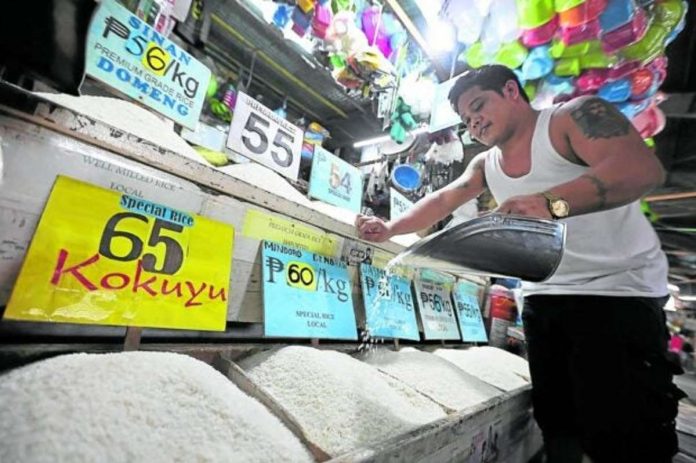
MANILA – Turning into reality President Ferdinand Marcos Jr.’s campaign promise to peg the price of rice at only P20 per kilogram remains a far-fetched possibility as agriculture officials cited on Tuesday external factors beyond their control that would make it hard to keep rice prices down in the coming years.
This was the reply House Deputy Minority Leader Mujiv Hataman got from officials of the Department of Agriculture (DA) where the president serves in a concurrent capacity as secretary.
During a hearing on the DA’s budget for next year, Hataman asked about the probability of Marcos’ campaign vow being realized once the country attains optimal rice self-sufficiency level.
When Agriculture Undersecretary Leocadio Sebastian replied, “Not P20 but at least we can maintain a lower price that is affordable,” Hataman commented: “But affordability is very relative.”
“Lowering the price to P20 would be quite difficult,” Sebastian told the lawmaker who then asked if the DA has a blueprint for achieving the president’s campaign promise.
“That is our goal when it comes to reducing the cost,” Sebastian said. Pressed further, he commented: “I cannot answer that.”
“To be honest, we never discussed those things you are asking with the president,” he admitted. “Reduction is included, but not P20.”
For her part, Agriculture Undersecretary Mercedita Sombilla cited various factors “beyond [their] control” as the reason behind rising rice prices.
According to her, prices in the local and global rice markets are influenced by international prices which have “spiked over time.”
Sombilla also cited last year’s rise in the farm-gate price of palay (unhusked rice) due to higher farm input costs.
Asked if reducing the price of a kilogram of rice to P20 could be achieved by 2028, she replied in the affirmative but qualified her answer by adding, “But the environment is volatile so this makes it difficult.”
The farm-gate price refers to the selling price between farmers and traders although it is largely dictated by the latter.
Data from the Philippine Statistics Authority showed that as of May, the farm-gate price of palay reached P19.06 a kilogram, an increase of 10.4 percent from P17.24 per kilogram a year ago.
Northern Mindanao recorded the largest farm-gate price increase among regions while Caraga, composed of the provinces of Agusan del Sur and Norte, Dinagat Islands, Surigao del Sur and Norte, and the cities of Tandag, Bislig, Bayugan, Cabadbaran, Surigao and Butuan, had the lowest.
In the country, the commercial price of rice is traditionally double that of the farm-gate price.
RISE Program pushed
To ensure stability in the price and supply of rice, AGRI party-list Rep. Wilbert Lee proposed on Tuesday a subsidy and incentive program that would make rice production profitable for some 2.6 million farmers.
“It’s about time that the government sets aside a subsidy to purchase rice from farmers at a price that will allow them to earn profits and support their families. If we let the problems in the agriculture sector worsen and pose heavier burdens on farmers, they will be discouraged from continuing their livelihood and we will have a hard time encouraging the youth to be involved in agriculture,” Lee said in a statement.
Under his proposed Rice Incentivization, Self-Sufficiency, and Enterprise (RISE) Program, the government would be mandated to allot funds to buy palay from local farmers at competitive prices and then sell the staple to consumers at affordable prices.
“With this subsidy, farmers can ensure that they can sell their produce at a fair price, and they will be encouraged to improve their production. We will have adequate rice supply and we won’t rely heavily on importation,” Lee said.
He added that selling rice to the public at lower prices would also “ease the burdens of our rice farmers and consumers, while helping ensure our food security.”
Lee suggested the RISE Program amid a spike in rice prices, with the staple being sold for as much as P62 a kilogram in some regions.
Based on the DA’s price monitoring per kilogram of rice as of Tuesday, local regular milled rice was being sold from P41 to P55 in Metro Manila compared to P38 a year ago.
As for local well-milled rice, the prices ranged from P46 to P57 as against last year’s P40 while for local premium rice, the prices were between P47 and P60 compared to P45 in 2022.
Local special rice, on the other hand, sold for P54 to P62, up from the previous P50.
At the moment, imported regular milled rice is not available but in August 2022, it retailed at P38.
Imported well-milled rice was sold at P46, lower than P41 in the past year.
Imported premium rice retailed from P47 to P57, up from the previous P45 while imported special rice ranged from P52 to P65 against P52 last year. (Jordeene B. Lagare, Julie M. Aurelio © Philippine Daily Inquirer)



